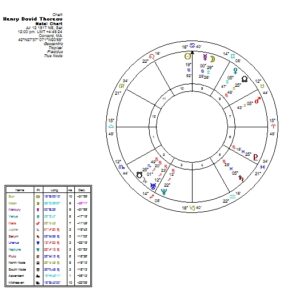The Transcendentalist literary and philosophical movement from mid-19th century New England stressed intuition, self-reliance and human godliness. Since the unseen and eternal were valued, Transcendentalists supported metaphysical thinking, which underlies an astrological world view. I believe that Evangeline Adams’ teacher, Dr. J. Heber Smith (1842-1898) and Adams herself were influenced by this movement, which was often allied with Unitarianism and reform.
Expect Great Things, Kevin Dann’s biography of Henry David Thoreau, explores his connections with the transcendent world. Thoreau captured personal insights and ecstatic experiences in his poetry and journals, many of which are shared in this book. He revered the power of nature and learned about Indigenous cultures.
 We don’t have a definitive birth time for Thoreau, but his Sun and Mercury closely contraparallel Uranus and Neptune show his insightful and intuitive focus. He wrote, “Every mortal sent into this world has a star in the heavens appointed to guide him. It has sent its beam to him, either through clouds and mists faintly or through a serene heaven.” And he believed that, “in eternity there is indeed something true and sublime.”
We don’t have a definitive birth time for Thoreau, but his Sun and Mercury closely contraparallel Uranus and Neptune show his insightful and intuitive focus. He wrote, “Every mortal sent into this world has a star in the heavens appointed to guide him. It has sent its beam to him, either through clouds and mists faintly or through a serene heaven.” And he believed that, “in eternity there is indeed something true and sublime.”
Thoreau read widely on classical hermeticism, the daimon, the ether and the immortality of the soul. He was a student of mythology, and while Thoreau was not an astrologer himself, his biographer considers seven-year cycles, Martian energies and the long-term influence of Neptune. Dann places the Transcendentalist movement near the planet’s discovery, word of which came to U.S. shores on October 20, 1846, nearly a month after its announcement (before transcontinental telegraph communications).
Before the name Neptune was settled on, Atlas was preferred for the planet (referencing the Titan obliged to hold up the heavens after their revolt against the Olympian gods). The first use of ether for anesthesia in the U.S. was on October 19 of that year, and it replaced mesmeric anesthesia (without the side effect of clairvoyance!). Dann sees this time as representing a turning point from a spiritual understanding of myth to its study as a purely academic subject, and the subsequent embrace of a mechanistic and materialistic view, when, in Thoreau’s words, “shams and delusions are esteemed for soundest truths.” The cycle of Neptune in Pisces from 1848-1862 spanned much of Thoreau’s career.
In addition to tracing Thoreau’s life of ideals and later support of John Brown, Dann also looks at Nathaniel Hawthorne and Margaret Fuller’s interest in mesmerism and spiritualism, and Ralph Waldo Emerson and Bronson Alcott’s efforts to convey Transcendental ideas to a wider audience.
A wonderful book for students of U.S. history, philosophy and metaphysical thinking. Kevin Dann has done a tremendous amount of research to capture not only the history, but also the soul and spirit of a man and his times.
Expect Great Things on Amazon.com
About my Amazon links.
